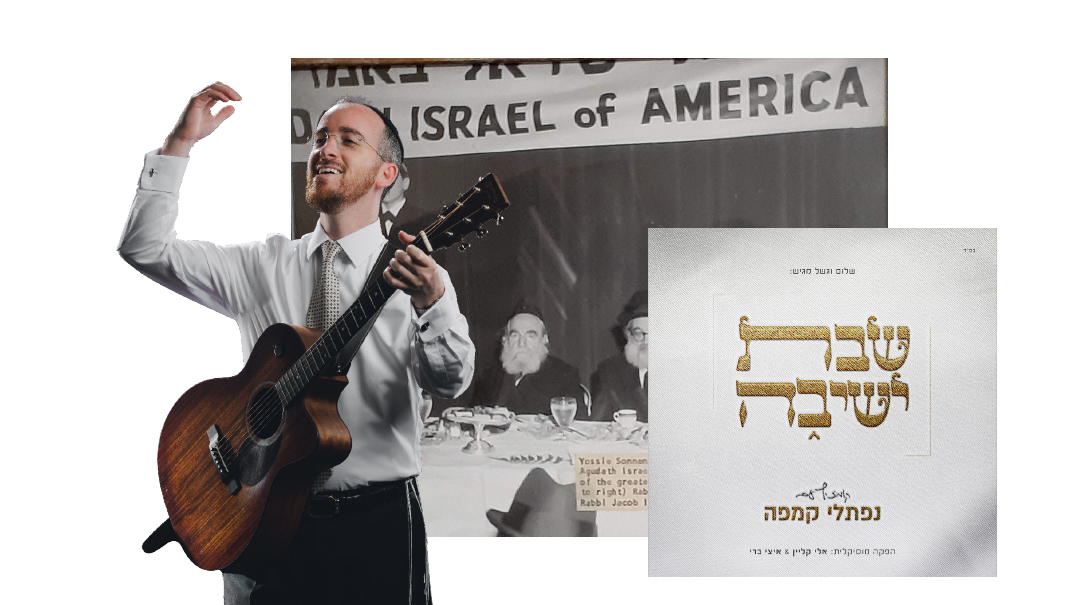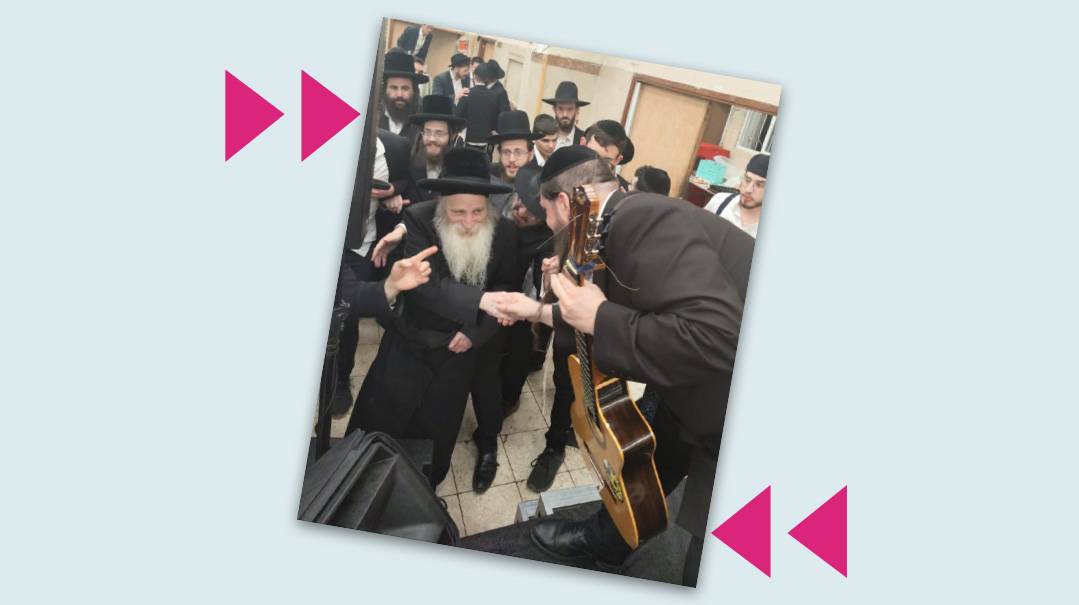Endnote — Issue: 1041
| December 17, 2024“Most of these songs are what we sang in yeshivah over Shabbos back in the day”

Early Shabbos
It’s an album designed to take you back to those days of singing around the Shabbos table in the yeshivah dining room — no matter how many years ago that was. Of course, NAFTALI KEMPEH’s latest album, SHABBOS YESHIVAH, isn’t only for yeshivah graduates, and with its warm and Shabbosdig feel, it’s a great mood enhancer and a bit of a nostalgia trip no matter where you were. Still, Naftali wanted to create another yeshivah kumzitz album in the style of last year’s Zman Elul release, this time with a Shabbos theme.
“Most of these songs are what we sang in yeshivah over Shabbos back in the day,” Kempeh relates. “I have strong musical memories from my yeshivah ketanah days in Yam HaTorah, and later in Kol Torah. We chose these tracks because they’re pretty much the standard Shabbos soundtrack in yeshivos all over.”
Today, Kempeh is popular in the American yeshivah world as well as in his native Eretz Yisrael. While he’s aware that the soundtracks differ slightly, he hopes this album will be a kind of bridge. For example, Ari Goldwag’s beautiful Kah Ribbon is quite popular with the American crowd but not so known yet in Israeli yeshivos, while the vintage Anim Zemiros composed half a century ago by Israeli chassidic music composer Avi Maslo never really caught on in America.
“I wanted to offer each crowd a new song,” says Kempeh.
One of the toughest decisions on this album — after the actual song selection — was whether to sing full songs on their own, or combine them together into a series of Shabbos medleys.
“I always prefer to sing a song by itself,” Kempeh explains. “That’s my style, to give full honor to the song and present it well, in a kumzitz style, without moving on quickly to the next before the first one is even finished — even though on Shabbos many of the songs and zemiros run into each other.”
Kempeh is highly popular both as a Melaveh Malkah singer and an Erev Shabbos “Toameha” singer for events, but he prefers not to work over Shabbos itself.
“It’s not as easy as it looks, to be ‘on stage’ for an entire Shabbos, with a constant expectation from the crowd that you’ll sing or lead the davening,” Kempeh says, “and that’s with no mic or sound system. On Shabbos I’m usually at home. I sing at home — the zemiros and nusach that my father sang.”
Mic Drop
Record Remix
What a nostalgic journey — the old Pirchei and Modzhitz hits sung back in the 1960s by wunderkind YUSSI SONNENBLICK have been remastered in his new release, YUSSI SONNENBLICK THEN & NOW. Marking 60 years since the first Pirchei record was released in 1964, Yussi shares from a treasure trove including such classics as “Eilecha” “Mi Ho’ish” “Shakah Chamah,” “Racheim Bechasdecha” and more. As a child with a golden voice, Yussi was the soloist on early Pirchei albums as well as Ben Zion Shenker’s Modzitzer Favorites. Now, as an accomplished adult singer known for his resonant performances on Dveykus and Journeys albums, Yussi breathes new life into those early recordings of his younger self. The original tracks of his youthful solos with their simple, vintage accompaniments are blended seamlessly with fresh musical arrangements by Yisroel Lamm, as Yussi harmonizes with his childhood self in 13 reimagined songs that have become classics over the decades.
In a childhood full of musical experiences, Yussi most treasures the opportunities he had to sing alongside Chazzan Moshe Koussevitzky. “He was the preeminent chazzan in the world at a time when chazzanus was widely celebrated,” Yussi recalls. “My father, a great admirer of chazzanus, introduced me to Chazzan Koussevitzky. Singing with him at numerous concerts remains one of the most incredible memories of my life.”
Yussi’s new album includes a chazzanus piece that he sang at a Moshe Koussevitzky concert held at Temple Beth El in 1965. “Concerts back then weren’t professionally recorded,” Yussi explains, “but Eli Gerstner, who worked on the mix, was amazed by the quality of the original recording I had — it was taped by my father, who sat in the audience in the shul with a recorder. You can even hear the applause at the end, which makes you feel like you’re transported right back there.”
Yussi didn’t even know where all the original tracks were stored. “Someone told me there were tapes with my name found in Rabbi Eli Teitelbaum’s basement, but who knows,” he says. Instead, he worked on digitized versions of the records and carefully edited them. To elevate the music beyond its original simplicity, Yussi enlisted Yisroel Lamm, his longtime friend from Camps Torah Vodaath and Sdei Chemed days, who brought a fresh perspective, enriching the arrangements with a diverse assortment of instruments.
His own favorite? “ ‘Racheim Bechasdecha.’ I’ve always loved it, it’s so hartzig. But honestly, I’m rediscovering all these old songs now that they’re at the forefront of my mind again.”
Sold Out
When I originally wrote “Bizchut HaTorah” together with Yitzy Berry for the last Siyum HaShas, we sent it to a number of singers to see if they’d be interested in recording it. It was sung by Motti Steinmetz at the grand Dirshu Siyum HaShas in 2019, and it’s gotten a lot of air play since then. So I was surprised when a singer called me a few months ago and asked me if he could buy the song, if no one else bought it yet. I guess he doesn’t listen too much to what’s out there. A few days later, he called back to say he’d just heard the song on the radio….
–Composer ELI KLEIN
Whenever Inspiration Strikes
For the first track on Journeys 5 – Chaveirim Kol Yisrael, I sat together with Abie Rotenberg in the studio for a few hours, and we came up with an intro. We went upstairs to eat lunch, came back down and listened, and said to each other, “This was a waste of time.” But instead of deleting that part, I just took it out of the way by moving it along to the end of the track. We came up with a new intro, finished the song again, and because I had placed the other piece at the end, the track just went into that piece. We loved it — using the intro we hadn’t liked at the end of the song seemed like a magical finish, taking you out of the song.
–Producer DONI GROSS
(Originally featured in Mishpacha, Issue 1041)
Oops! We could not locate your form.






